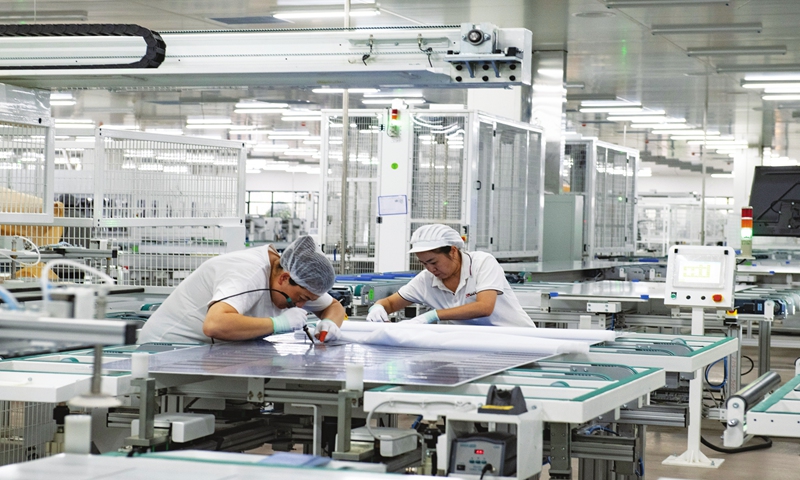Chinese PV makers call for closer global cooperation to mitigate climate change, improve human habitat

Workers are busy filling orders for solar photovoltaic modules on a production line in Jinhua, East China's Zhejiang Province on November 8, 2023. Photo: VCG
China's photovoltaic (PV) companies have contributed significantly to the ongoing global clean energy shift and are gearing up to accelerate the great transformation, said industry players and experts, noting that Chinese companies now hold a global edge in the transition, supported by the country's complete industrial value chain.
Chinese enterprises have made significant contributions to this energy transformation process, Li Zhenguo, president of LONGi Green Energy Technology Co, told the Global Times in an exclusive interview, on the sidelines of the just-concluded 2023 Asia-Pacific Economic Cooperation (APEC) business leaders' conference in San Francisco.
In recent years, thanks to their consistent technological innovation, Chinese companies have been driving the energy transition as well as cost reduction in the PV industry, according to Li.
Huge contribution
"This has made PV power the most affordable energy source in many countries and regions today, which also provides a strong support for achieving our country's carbon neutrality goal and accelerating the energy transition," Li said.
China's PV module production accounts for over three-quarters of global market share, with cumulative installed solar panels capacity ranking first in the world, data from National Development and Reform Commission revealed in July 2022.
China's exports of PV products reached $32 billion in the first seven months of the year, representing a year-on-year increase of approximately 6 percent, reaching a historic high, according to media reports.
Driven by increased demand for PV installations in Southeast Asia, Europe, the US, Latin America and elsewhere, coupled with the accelerated overseas expansion of new-energy enterprises, China's PV product exports are expected to approach $60 billion in value in 2023, representing a year-on-year growth of around 20 percent, according to Zhang Sen, the secretary-general of the Photovoltaic Branch of the China Chamber of Commerce for Import and Export of Machinery and Electronic Products.
In addition to shipping their PV products all over the world, major Chinese PV firms also have ramped up efforts to expand overseas footprint.
For instance, in order to better serve local developers and distributors in the Middle East, another Chinese PV maker JA Solar has set up branches in the region to enhance localization of services.
"The Middle East region is expected to be the third-largest market for green and new energy in the coming two to three years. Chinese companies are leading the world in manufacturing, assembly and project contracting and construction in the new energy sector, which makes them competitive," Zhu Daocheng, vice president of the company, told the Global Times in a recent exclusive interview in Beijing.
The firm has partnered with UAE-based AMEA Power to supply 560 megawatt (MW) of high-efficiency modules for the Kom Ombo Abydos solar panel project in Egypt. The project, which commenced in January this year, is expected to be completed within 19 months and will stand as the largest single solar panels maker in Africa once finished, according to JA Solar.
Under the promotion of the Belt and Road Initiative (BRI), JA Solar has contributed to the clean power supply and low-carbon transformation in many BRI partner countries.
The company listed in a statement that in Uzbekistan, it supplied all the components for the country's first solar power station. In Hungary, it provided high-efficiency modules for the Kaposvar 100MW Solar Power Station, a key project in energy cooperation between Hungary and China. In Vietnam, the company supplied high-efficiency modules for several of its major solar power projects.
Competitive advantages
There is no doubt that Chinese PV enterprises possess the strongest competitiveness in the world, Lin Boqiang, director of the China Center for Energy Economics Research at the Xiamen University, told the Global Times on Sunday.
The competitiveness is backed up with the nation's complete industrial chain integrating from the upstream to downstream sectors, Lin noted.
And even though the PV sector production now faces a temporary supply glut, the current capacity is nearly negligible compared to the future demand for new-energy installations, and, Chinese enterprises have tremendous growth potential in the future, Lin said.
China and the US recently released "The Sunnylands Statement on Enhancing Cooperation to Address the Climate Crisis", affirming support of a declaration by G20 leaders to triple global renewable energy capacity by 2030 and the two nations also agreed to "accelerate the substitution for coal, oil and gas generation."
This development has been viewed by the market as a positive signal for the development of the PV industry as the US used to sanction Chinese PV makers under the baseless pretense of "human right violations" accusation targeting Northwest China's Xinjiang Uygur Autonomous Region.
Meanwhile, Lin warned that the US has consistently employed the tactic of expressing cooperation verbally while setting up obstacles in action.
LONGi's Li called for all countries to put aside their selfish geopolitical considerations and adopt a more open and cooperative attitude to new-energy equipment trade in order to accelerate global efforts to reduce greenhouse gas emissions and mitigate global warming.
For instance, some countries may use energy independence and energy security as excuses for impeding global cooperation, and shielding their protectionist practices. Their trade barriers are becoming a serious source of concern, environmentalists said.
"Of course, what we sincerely hope is that geopolitical tensions should come down. Ideally, these countries could stop their obstruction, and adopt a positive attitude to global cooperation. It would allow us to focus more on technology innovation and work in a more mutually beneficial way to do business, while contribute more to improve habitat on our planet," Li noted.